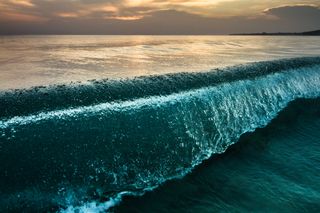
Why can't we drink saltwater?
The Earth's surface is 71% water, but just 3.5% of it is drinkable.

Water is essential for our survival, and yet more than 96% of the planet's liquid water is ocean water — and it contains so much salt that it's undrinkable by humans.
Salty sea water won't quench your thirst, and drinking too much can even lead to death by dehydration.
But if saltwater is still water, why can't we drink it?
The answer to that question is actually pretty straightforward: Saltwater is simply too salty for our kidneys to manage.
Approximately 3.5% of seawater's weight comes from dissolved salt, according to the National Oceanic and Atmospheric Administration (NOAA). If all the salt in the oceans were removed and spread over every land surface on Earth, the salty layer would tower more than 500 feet (166 meters) high — about as tall as a 40-story office building, NOAA says. The saltiness, or salinity, of seawater is too high for humans to safely process, as our cells require water "in a relatively pure form," said Rob DeSalle, a curator in the Sackler Institute for Comparative Genomics at the American Museum of Natural History in New York City.
"For most animals, the kidneys filter impurities out of water," DeSalle told Live Science, told Live Science. "What happens when you drink saltwater is you ingest a lot of salt that the body now needs to wash out [of the body]."
Related: Why can't humans digest corn?
Sign up for the Live Science daily newsletter now
Get the world’s most fascinating discoveries delivered straight to your inbox.
It does this in the form of urine, which the kidneys produce by dissolving impurities in excess water, which is then sent to the bladder to be eliminated. But the kidneys can only produce urine that is less salty than our blood, according to the National Oceanic and Atmospheric Administration, and saltwater contains more than three times the amount of salt that is normally present in human blood. This means that for every cup of saltwater you drink, you'd need to drink at least the same volume of water in order for your kidneys to flush out all that salt.
"You might say ‘why not just drink more saltwater?'" DeSalle said. "But then you're just left with more salt that you'd then have to flush with even more water. So saltwater can never quench your thirst — it can only make you thirstier."
Some animals can drink saltwater, so why can't we?
Some animals, in ocean ecosystems, however, have adaptations that allow them to safely drink saltwater. Seabirds such as albatrosses, gulls and penguins, which might spend weeks on the open ocean with no freshwater in sight, have specialized salt glands and grooves in their bills for filtering and purging excess salt from ingested water before it hits their stomachs and is absorbed into their blood, according to the Audubon Society. Marine mammals such as whales, dolphins and seals have also evolved adaptations to life in an environment where freshwater is scarce or absent.
"Marine mammals have adapted special enzymes and cellular structures that allow them to purge excess salt from their systems," DeSalle said. "It's like they have super kidneys."
So why don't we? Why did humans — and nearly all other land animals, for that matter —evolve to drink freshwater when saltwater is so much more plentiful? As animals emerged from the ancient seas hundreds of millions of years ago and began adapting to life on land, species moved away from coastal habitats where there was lots of saltwater. Many terrestrial species — including our primate ancestors — eventually came to inhabit inland ecosystems that had plenty of freshwater in lakes and rivers, but very few, if any, saltwater sources. This likely shaped biological adaptations for drinking water that wasn't salty.
"Most of our ancestors were not exposed to saltwater, whether it's animals in general, primates, or insectivores," DeSalle said. "So natural selection honed in on processing unsalty water, and our physiology became so fine-tuned that disrupting it with saltwater down the line becomes very dangerous and damaging."
Originally published on Live Science on Jan. 28, 2013 and rewritten on June 23, 2022.

John is a Brooklyn-based journalist who was named a CES 2020 Media Trailblazer for his science and technology coverage. He holds a Masters Degree in Computer Science and has been a writer for most of his life. When he is not writing about science, he is the US Computing Editor for TechRadar.
